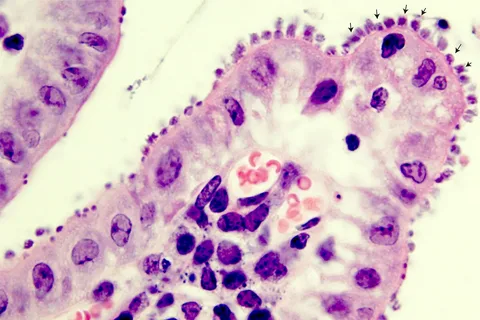Cryptosporidium is a parasite that damages the small intestine and is one of the leading causes of diarrhea-related deaths in children. It is also commonly found in individuals with weakened immune systems.
The study built upon previous research that showed individuals with higher levels of indoles in their feces were resistant to Cryptosporidium infection. Indoles are molecules typically found in cruciferous vegetables such as broccoli and are known to activate the AHR system, a receptor that regulates barriers in the gut, skin, and lungs.
Two laboratories at the Crick collaborated to investigate the role of the AHR system in protecting against Cryptosporidium infection. The researchers exposed mice to the Cryptosporidium parasite and observed that the infection triggered an expansion of immune cells in the intestinal epithelium, which forms the first line of defense against the parasite.
When these CD8+ T cells were transferred to mice with weakened immune systems, the mice were able to successfully fight off the Cryptosporidium infection. On the other hand, mice lacking the AHR receptor or those fed a diet specifically lacking in indoles had a reduced population of intestinal CD8+ T cells, impairing their ability to combat the infection. This finding highlights the dependence of CD8+ T cells on the AHR system for intestinal protection.
In a final experiment, nursing mouse mothers were given indoles, which were then transferred to their offspring through breast milk. When exposed to Cryptosporidium, the young mice did not become ill. This suggests that the AHR system may provide protection against infections in newborns.
This research is particularly significant for humans, as the majority of life-threatening Cryptosporidium infections occur within a child’s first year of life. Murali Maradana, joint first author with Bishara Marzook, is currently investigating the impact of providing nursing mothers with indole supplements in India to transfer protection to their children.
Adam Sateriale, the Group Leader of the Cryptosporidiosis Laboratory at the Crick, emphasized the severity of Cryptosporidium infections, which can be fatal, especially in malnourished children who often experience recurring infections. Sateriale expressed excitement about the potential of indole supplements being added to therapeutic food formulas in regions where Cryptosporidium is prevalent. Maradana’s continued exploration of this intervention in his new role in India is highly valued.
Gitta Stockinger, the Group Leader of the AHR Immunity Laboratory at the Crick, highlighted the significance of activating the AHR system in mounting an immune response against Cryptosporidium, stating that this mechanism could potentially be applicable to other types of intestinal pathogens.
In conclusion, the study’s findings suggest that dietary molecules that activate the AHR system, such as indole-3-carbinol, could disrupt the cycle of chronic Cryptosporidium infections and safeguard young children from falling ill if provided to nursing mothers. This discovery opens up possibilities for the development of preventative measures against Cryptosporidium infections, particularly in vulnerable populations.
Note:
1. Source: Coherent Market Insights, Public sources, Desk research
2. We have leveraged AI tools to mine information and compile it



